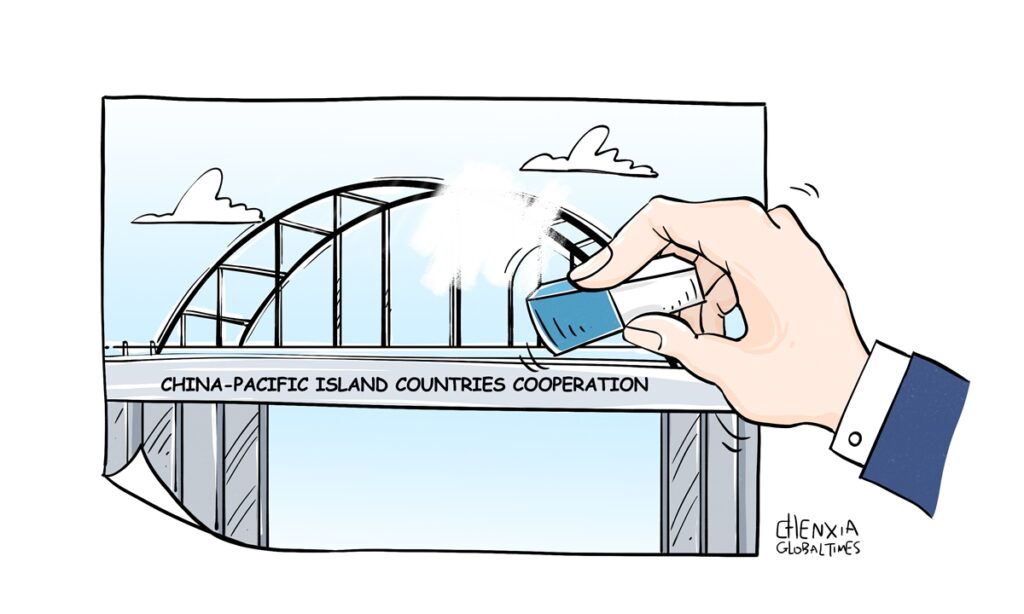Australia overcame “last-minute concerns to secure” the Pacific Policing Initiative (PPI) on Wednesday during the Pacific Islands Forum (PIF) held in Tonga. Experts pointed out that despite doubts from some island leaders, it is not surprising that this initiative was passed, as there is Western strategic pressure that is hard to resist.
According to reports, the initiative will create a multinational policing force that can be deployed to countries in the region in the event of major incidents or crises and a coordination hub will be based in Brisbane. There have been doubts during the process of advancing this initiative. It’s necessary to “make sure that this PPI is framed to fit our purposes and not developed to suit the geo-strategic interests and geo-strategic denial security postures of our big partners,” Vanuatu Prime Minister Charlot Salwai publicly stated.
The concerns of Pacific Island leaders are not unfounded. The expectations of Pacific Island nations for the PPI mainly focus on addressing organized crime and tackling transnational security challenges, such as drug trafficking in the Pacific. However, as Australian officials and media revealed, one of the true motives behind PPI is to “help contain China’s security presence in the region.” No wonder there are doubts that Australia’s push for the PPI is driven by impure motives, focusing on geopolitical competition rather than cooperation.
“This is essentially a geopolitical game to intervene in or even control the security decisions, defense and other internal and external affairs of regional countries through the initiative, aiming to exclude China and serve the US’ ‘Indo-Pacific Strategy,'” Chen Hong, director of the Australian Studies Center of East China Normal University, told the Global Times.
Some Australian media outlets have referred to the PPI as a “godsend.” In reality, for the Pacific Island nations, the most direct and urgent security threats are climate-related issues such as rising sea levels. Many leaders have called for Australia, as a major producer and exporter of fossil fuels, to do more on climate issues, yet Australia has chosen to focus on police cooperation. This reveals that Australia’s intentions are not genuinely concerned with the real security and well-being of the island nations, and the so-called godsend is more of a celebration of Australia’s own geopolitical schemes.
Director-General of the Melanesian Spearhead Group Leonard Louma described the PPI as “cryptic.” Under the guise of regional security, the lack of transparency in PPI is a concern for all Pacific Island countries, Chen Hong pointed out. “Australia’s police initiative is exclusive and heavily laden with geopolitical overtones, with certain provisions being unfair to the Pacific countries. The initiative attempts to place Pacific policing entirely under Western control, excluding China’s presence. This could potentially militarize and securitize what should be regional cooperation based on development and cooperation, thereby undermining the sovereignty and strategic autonomy of the countries in the region,” Chen said.
In recent years, China’s mutually beneficial cooperation with the Pacific region has expanded from economic to security and social spheres. Pacific countries have welcomed the positive outcomes of China-Solomon Islands police cooperation. However, the US and Western countries, who frequently use policing as a means to gain control of Pacific Island countries, view this as a threat to their interests and thus resort to various forms of obstruction.
China’s position in the Pacific region has always been clear: It does not target a third party. Regarding the PPI, this initiative should not come at the expense of the mutually beneficial and friendly relations between China and the Pacific Island nations. For Pacific Island countries, facing economic growth demands and climate change crises, there is a greater need to make independent decisions, eliminate interference and focus on long-term interests.
GT




